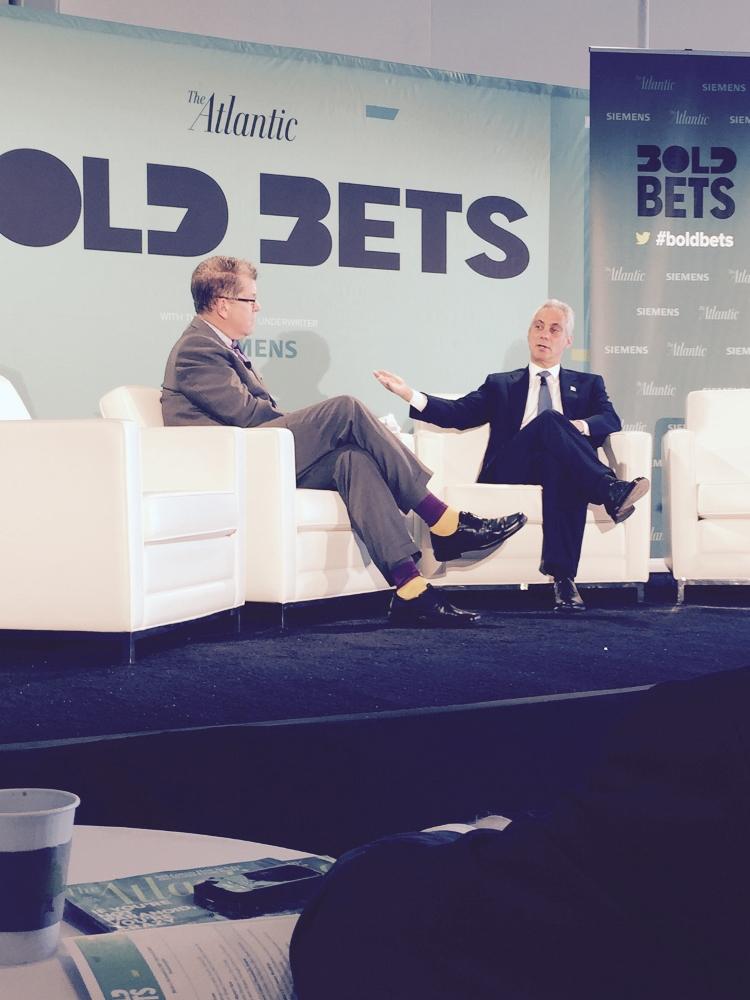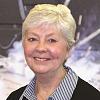- FMA
- The Fabricator
- FABTECH
- Canadian Metalworking
Categories
- Additive Manufacturing
- Aluminum Welding
- Arc Welding
- Assembly and Joining
- Automation and Robotics
- Bending and Forming
- Consumables
- Cutting and Weld Prep
- Electric Vehicles
- En Español
- Finishing
- Hydroforming
- Laser Cutting
- Laser Welding
- Machining
- Manufacturing Software
- Materials Handling
- Metals/Materials
- Oxyfuel Cutting
- Plasma Cutting
- Power Tools
- Punching and Other Holemaking
- Roll Forming
- Safety
- Sawing
- Shearing
- Shop Management
- Testing and Measuring
- Tube and Pipe Fabrication
- Tube and Pipe Production
- Waterjet Cutting
Industry Directory
Webcasts
Podcasts
FAB 40
Advertise
Subscribe
Account Login
Search
Collaboration is key to training next generation
- By Sue Roberts
- December 17, 2015
- News Release
- Shop Management

Chicago Mayor Rahm Emanuel (right) discussed the city’s initiatives to provide the skilled workforce necessary for advanced manufacturing with The Atlantic Editor-at-Large Steve Clemons during a Bold Bets event in Chicago.
In a room packed with educators and other invited stakeholders from the Chicago area, the question up for discussion was what will it take to satisfy manufacturing's future manpower needs. The assembly was brought together as part of the Bold Bets series of manufacturing-based events held across the country that were organized by The Atlantic and underwritten by Siemens USA.
One word surfaced as the answer to filling the pipeline with skilled, young manufacturers: collaboration. The consensus was that educators, government, labor advocates, and industry members not only need to be in the game, but they need to work together as a team.
Chicago Mayor Rahm Emanuel, featured guest, discussed several Second City initiatives implemented during his administration with the goal of attracting and training a pool of skilled labor to continue and advance Chicago’s standing as a global manufacturing hub.
Eric A. Spiegel, president and CEO of Siemens USA, opened the discussion by affirming the company’s dedication to continuing their partnerships with educators and government entities to increase interest in industry among members of the next generation and to prepare them for careers in advanced manufacturing. He also praised Chicago’s efforts to do the same.
“Meeting the challenges of the future starts with actions and partnerships between the public and private sectors. Collectively we must foster a culture of innovation and dedicate ourselves to providing the education and training necessary,” he said.
Referring to a recent area of collaboration, he continued, “We supported Mayor Emanuel’s commitment to preparing the next generation for college and career demands by partnering in a STEM program for Chicago’s public high schools to offer students real-world engineering opportunities.” Siemens is also a founding partner and software supplier to Chicago’s UI (universities plus industries) Labs’ Digital Manufacturing and Design Innovation Institute (DMDII).
Steve Clemons, Washington editor-at-large for The Atlantic, discussed Chicago’s initiatives to prepare the next generation for the digitized workplace with Emanuel.
“Manufacturing used to be a job,” said Emanuel. “Today it is a career. Making sure that people see manufacturing as a good-paying job with career potential is how you get people to reframe their minds’ eye from manufacturing as being making widgets to a career path to a pretty substantial middle-class standard of living.
“Understanding that capacity and the ability to handle computers is the manufacturing of tomorrow, we are creating the education and research—the brains and brawn—that go into making Chicago the most competitive city in manufacturing.”
Steps to reach that goal include:
- Waiving city community college tuition to any student maintaining a B average. “We haven’t updated our educational programs, as a country, to get with the 21st century. Our educational system stops at the 12th grade commitment, and yet the jobs of tomorrow require a minimum of two years post-high school. We’ve tried to give everybody the opportunity for up to a 14th grade education,” said Emanuel.
- Naming Daley Community College as the center for manufacturing education. The college includes two certificate programs specifically designed to prepare students for careers in advanced manufacturing: computerized numerical control machining and factory automation. Industry was called upon to help design the curriculum. “We brought consolidation to the educational programs so you don’t have to have a PhD to decide which program is best. The training is relevant to the industry doing the hiring. We are training people so that having Daley on their resume will get them in the door,” Emanuel said.
- Introducing younger students to what is involved in manufacturing today, the jobs available, and the educational opportunities at Daley Community College through field trips. “It’s just like going to the museum,” said Emanuel.” We organize field trips to expose students to manufacturing, the jobs, the factories, and Daley Community College. Students are exposed to what is going on in and around their neighborhood that can provide jobs.”
- Securing digital manufacturing research within the city via an expanded partnership between Chicago, Siemens, and the UI Labs’ DMDII. Spiegel described the program as “a collaborative spirit of industry, academia, nonprofit, and government partners encouraging manufacturers to embrace manufacturing’s software revolution, while focusing on science and engineering education for young people.”
- Focusing on science and engineering education for young people through actions like working with Siemens to offer students at Bowen High School engineering opportunities. Advanced placement calculus and robotics are part of the class offerings. The mascot: boilermakers.
Regarding efforts to train the next generation to serve the advanced manufacturing industry, Emanuel has a formula: “We need to make it easy, make it simple, make it relevant. Relevant not just to workforce development, but to the larger point of bringing students to two years of post-high school education.”
About the Author

subscribe now

The Fabricator is North America's leading magazine for the metal forming and fabricating industry. The magazine delivers the news, technical articles, and case histories that enable fabricators to do their jobs more efficiently. The Fabricator has served the industry since 1970.
start your free subscription- Stay connected from anywhere

Easily access valuable industry resources now with full access to the digital edition of The Fabricator.

Easily access valuable industry resources now with full access to the digital edition of The Welder.

Easily access valuable industry resources now with full access to the digital edition of The Tube and Pipe Journal.
- Podcasting
- Podcast:
- The Fabricator Podcast
- Published:
- 04/16/2024
- Running Time:
- 63:29
In this episode of The Fabricator Podcast, Caleb Chamberlain, co-founder and CEO of OSH Cut, discusses his company’s...
- Industry Events
16th Annual Safety Conference
- April 30 - May 1, 2024
- Elgin,
Pipe and Tube Conference
- May 21 - 22, 2024
- Omaha, NE
World-Class Roll Forming Workshop
- June 5 - 6, 2024
- Louisville, KY
Advanced Laser Application Workshop
- June 25 - 27, 2024
- Novi, MI































